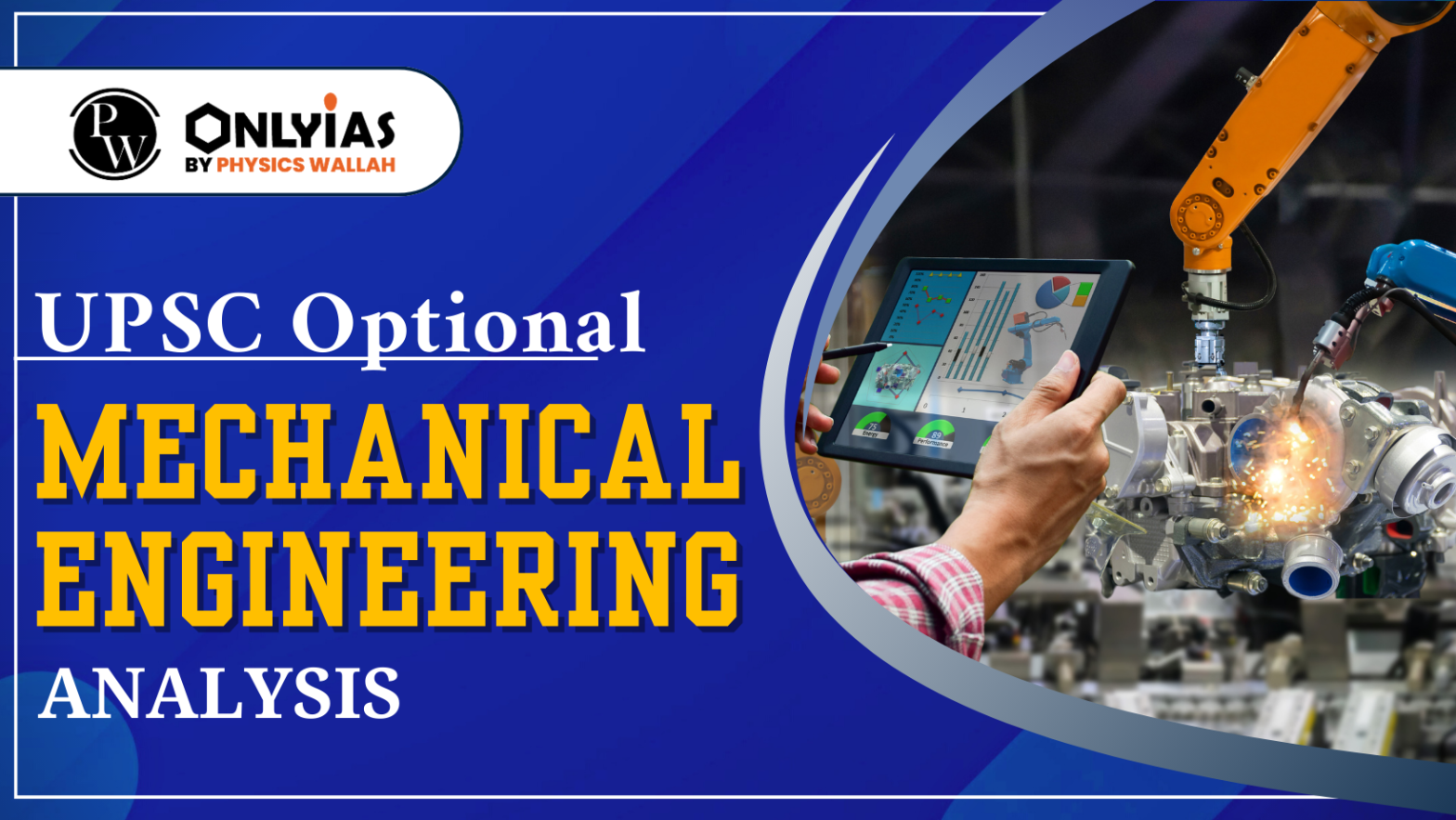UPSC Mechanical Engineering Optional consists of 2 papers each carrying 250 marks. Read detailed information about UPSC Mechanical Engineering Optional Paper, Analysis, Previous Year Questions and Preparation Strategy.

Mechanical engineering is a field focused on designing, constructing, and utilizing machinery. It’s among the optional subjects available for the UPSC civil services mains exam, particularly for engineering graduates. Due to its specialized nature, it’s recommended primarily for those with an engineering background. In this article, you can explore all aspects of choosing Mechanical Engineering as an optional subject for the IAS exam, including strategies, insights from toppers, recommended booklists, success rates, and much more.
UPSC provides engineering subjects as optional choices for the Civil Services (Main) examination, including mechanical, civil, and electrical engineering, all fundamental branches of engineering. Interestingly, the mechanical engineering optional subject has relatively fewer takers among UPSC aspirants, with many candidates pursuing Indian Engineering Services (IES) aspirations alongside their civil services goals.
The UPSC Mechanical Optional Paper 1 covers important subjects like Mechanics, Engineering Materials, Theory of Machines, and Manufacturing Science. To do well in this paper, candidates should focus on understanding these topics thoroughly. It’s crucial to have a strong grasp of the basics and practice solving previous year’s question papers. This approach will help candidates prepare effectively and boost their chances of success in the UPSC Mechanical Optional Paper 1.
The UPSC Mechanical Engineering Optional Paper 2 encompasses a wide range of crucial topics, including Thermodynamics, Gas Dynamics, Turbine, Fluids, Regeneration, Heat Transfer, I.C. Engines, Refrigeration and Air Conditioning, Psychometry, and Steam Engineering. To excel in this paper, candidates must undertake comprehensive preparation for each of these subjects. It’s essential to build a strong foundation in all areas and thoroughly understand the concepts. With a well-rounded preparation strategy, aspirants can confidently tackle the UPSC Mechanical Optional Paper 2 and enhance their chances of success in this competitive examination.
PWOnlyIAS will cover the UPSC Mechanical Engineering Optional Paper Analysis here. With the UPSC Mains Optional exam just around the corner on September 24th, our live analysis will give you a clear idea of how tough or easy the paper is and its overall difficulty level. We’re here to provide you with valuable insights to help you approach the exam confidently. Keep an eye on PWOnlyIAS for in-depth UPSC Mechanical Paper analysis, and use this information to boost your performance in this important exam.
Candidates can find the UPSC Mechanical Engineering Optional Previous Year Question Papers in the table given below:
Check the UPSC Mechanical Optional Success Rate is listed in the table given below:
| UPSC Mechanical Optional Success Rate | |||
|---|---|---|---|
| Year | Number of Candidates | Number of Candidates Selected | Success Rate (%) |
| 2020 | 201 | 22 | 10.9% |
| 2019 | 213 | 12 | 5.6% |
| 2018 | 152 | 9 | 5.9% |
| 2017 | 170 | 19 | 11.2% |
Understand the Exam Questions: Start by analyzing previous UPSC Mechanical Engineering question papers to grasp the types of questions asked.
Thoroughly Cover Theory: Ensure a strong foundation in theory by studying the subject comprehensively.
Practice Solved Examples: Work through numerical problems in standard textbooks to gain practical problem-solving skills.
Solve Previous Year Numerical Questions: Practice numerical questions from past UPSC papers to familiarize yourself with the exam’s pattern.
Simulate Exam Conditions: Use test series to mimic exam settings, helping you adapt to writing comprehensive answers within time constraints and choosing questions wisely.
Take Notes: Create notes for each subject, considering the various study sources available. Also, maintain a separate set of formula notes for quick last-minute revisions.
Revision: Revise the entire mechanical engineering syllabus at least twice before the mains exam. This is crucial due to the extensive syllabus and numerous formulas.
Use Diagrams and Graphs: Incorporate diagrams and graphs where necessary in your answers. They not only enhance your score but are often essential for providing a complete response.
| UPSC Optional Paper Related Links | |
| UPSC Electrical Engineering Optional Paper | UPSC Mathematics Optional Paper |
| UPSC PSIR Optional Paper | UPSC Anthropology Optional Paper |

<div class="new-fform">
</div>